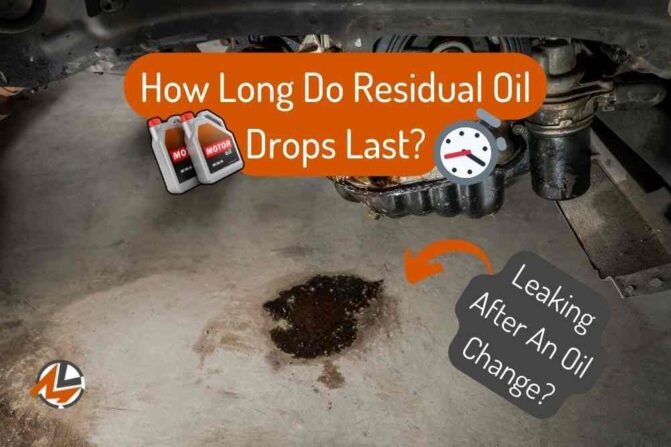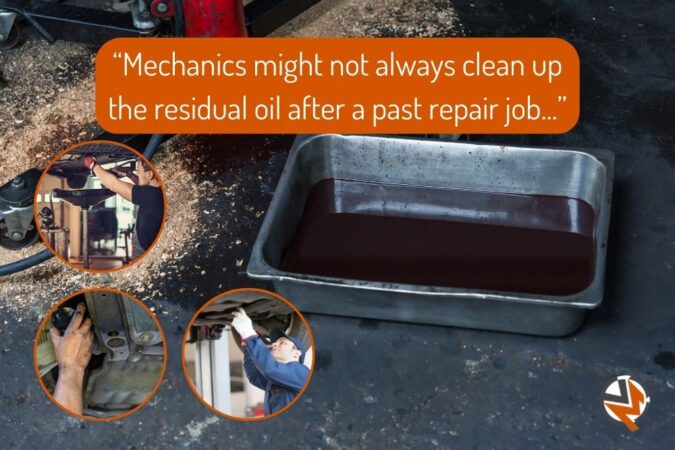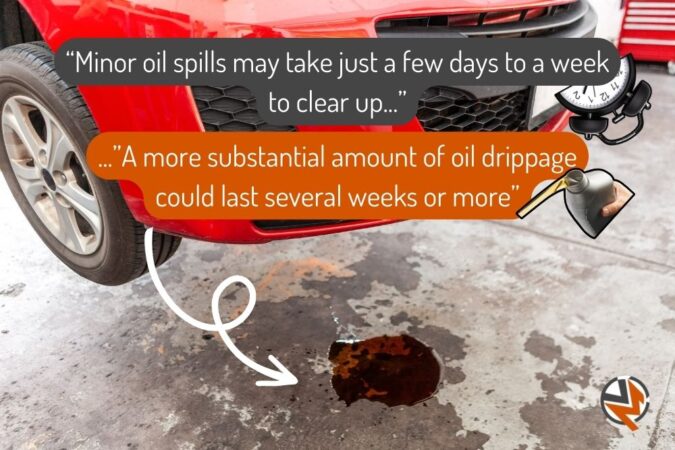One of the most disheartening things that any car owner can stumble on is an oil leak, and more so if your car is leaking motor oil after an oil change. So, how long do residual oil drops last, and what’s causing it?
Seeing some oil leakage after getting an oil change at your local mechanic or service center is actually quite normal. Most of the time, it’s just some random spillage, or at other times, it could just be residual oil.
If you’re noticing any oil leaks, it’s crucial to monitor to severity of the leak itself. A minor amount of spilled oil might take a few days to a week to clear, but any more than that, and you should get it checked out.
- Why Is It Leaking After An Oil Change?
- How Much Time Before It Disappears?
- What Can You Do About This?
Oil Leak After Oil Change
If you’re noticing any oil leaks underneath or around your car, and in particular, after getting an oil change done, it’s typically caused by either one of the following, in most instances:
1. Spillage During The Oil Change
This is something that I’m guilty of many a time, but oil changes are never clean. Whether it’s draining out the old engine oil, or when you’re pouring in the fresh oil, it’s typical for oil to splash around or spill.
For instance, when the drain plug is removed too quickly when getting rid of the old oil, or if your motor oil is still too warm, causing it to flow out more rapidly, or if it drips off the funnel when filling in fresh oil.
Thus, it can accumulate in the recessed areas of the undercarriage, around the filter, or even on the chassis. Over time, this accumulated oil can start to drip, giving the impression of a leak, when it actually isn’t.
2. Residual Oil From Past Work Or Repairs
When certain parts are replaced or repaired, especially those that are associated with your car’s oil system, such as gaskets, seals, or the oil pan, residual motor oil can be left behind, and they can accumulate.
Sometimes, mechanics might not always clean up all of the residual oil entirely after a repair job. Therefore, for all my fellow DIYers out there, it’s essential to practice post-repair clean-up to avoid such issues.
3. Faulty Gaskets Or Seals
Over time, the seals and gaskets in your car can wear out or get damaged, leading to small leaks. Seals and gaskets play a crucial role in ensuring that motor oil doesn’t leak out of its designated pathways.
If they’re not functioning correctly, it can lead to small oil leaks, which might be mistaken for residual oil. An actual oil leak, caused by bad seals or gaskets, can lead to more significant issues if not fixed promptly.
How Long Does It Take For The Residual Oil To Disappear
With that in mind, how long do residual oil drops and leaks last? Well, it depends, mainly on how severe the underlying motor oil leak is. For the most part, minor spills may take just a few days to a week to clear up.
The latter includes spills or splashes of engine oil, like a few drops spilled during the pouring process, as well as residual oil from previous repair work or oil changes. If it does disappear by then, it’s not a major issue.
However, if a more substantial amount of oil has been spilled, it could result in drips that last several weeks or more. Therefore, it’s vital that you take active steps to monitor the severity and timespan of the oil leak.
One easy way to do this is by placing a piece of cardboard or blank paper under your car overnight to gauge the amount of oil dripping. If the leak diminishes over a few days or a single week, it’s likely residual oil.
What Can You Do About An Oil Leak?
Having dealt with countless residual oil drops before, there are actually a few clever little tricks that you can practice in getting rid of residual oil leaks, or at least, expediting the time taken before it disappears…
- Drive Your Car – Driving can actually help clear up the residual oil. The heat from a running engine can help with evaporating some of the residual oil, while a moving car can help displace any accumulated engine oil.
- Environmental Factors – Following up on my earlier point, longer drives could help with clearing up residual oil. On top of that, rainwater can wash away residual oil, while hot weather can accelerate its evaporation.
- Remove Your Splash Shield – Some cars have a splash shield underneath the engine. Here, residual oil could get trapped, leading to prolonged leaking. So, it might be beneficial to remove and clean the splash shield
- Consult A Mechanic – If you’re unsure about the source of the leak or if it persists for a long time, it’s always a good idea to consult with a mechanic. They can help identify the problem and advise on any repairs.



